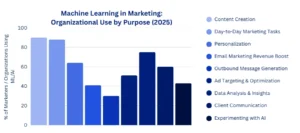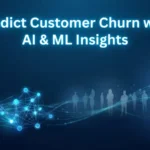Automation is the future of every industry. Workflows can be automated in many ways, but when it comes to specific industries, certain technologies are better suited to different sectors. Similarly, implementing machine learning in marketing is the best way to bring automation. This technology helps brands connect with their customers. It happens because of the data generated by consumers. Marketing professionals can now analyze customer data through machine learning and plan further.
What Is Machine Learning
Machine learning is a subset of artificial intelligence (AI). It allows the system to learn from data and improve performance on specific tasks without explicit programming. It involves the creation of algorithms to identify patterns in data and make decisions or predictions based on that data. This technology is widely used in speech processing, image recognition, recommendation systems, fraud detection, and autonomous vehicles. Machine learning works through a structured process:
- Data Collection
- Data Processing
- Model Selection
- Training
- Evaluation
- Fine-Tuning
- Prediction
How is Machine Learning in Marketing a Transformative Breakthrough?
Machine learning in marketing sector brings transformation through data-driven decisions, automation, and personalized experiences. Marketing professionals can now observe customer behaviour in detail, find hidden patterns, and predict future scenarios precisely. For example, including a recommendation engine in an e-commerce system will enable real-time, tailored product recommendations. This improves a customer’s buying experience. Even dynamic pricing strategies also change depending on customer characteristics and demand. Machine learning powered chatbots provide immediate assistance.
Machine learning in marketing reduces marketers’ load from complicated goals, providing time to concentrate on strategy and creativity. ML offers deeper insights into customer behavior, preferences, and developing trends by analyzing large amounts of data.
Market Overview of Machine Learning in Marketing
Machine learning in marketing is spreading like wildfire. With a compound annual growth rate of more than 25%, recent forecasts expect the worldwide market for AI in marketing to cross $ 100 billion by 2028. More than 90% of marketing companies are utilizing or planning to include ML and artificial intelligence in their work.
This rise in the implementation of machine learning in marketing is because:
- Exponential expansion of digital data
- Demand for real-time personalization
- Improvements in cloud computing and machine learning techniques
- The need for campaign optimization and quantifiable ROI
Marketing companies must look for some AI development companies to adopt machine learning in marketing. Very soon, the way marketing companies work will be pretty much automated.
Use Cases Of Machine Learning in Marketing
Machine learning in marketing utilizes a range of applications that change how marketers engage customers and create strategies. Some of the most impactful use cases of machine learning solutions are:
Customer Segmentation and Targeting
Machine learning algorithms can assess demographic, behavioral, and transactional data to identify customer segments. This allows marketers to customize their campaigns for different groups. This improves engagement and conversion rates.
Data-Driven Decisions
ML in marketing is a blessing because of its predictive capabilities. Predictive analytics utilizes machine learning to predict customer behavior, sales trends, and campaign outcomes. Marketing professionals can use this information to allocate resources efficiently. This also helps optimize strategies for maximum impact.
Personalization and Recommendation Engines
The modern-day marketing revolves around personalization. ML-driven recommendation engines observe browsing and purchase history to provide personalized product suggestions. This increases sales and customer satisfaction.
Content Creation Automation
Natural language processing and other machine learning models can create content like product descriptions, emails, social media posts, marketing material, etc. Apart from creation, it can also curate relevant content for specific segments.
Automation of Marketing Campaigns
Machine learning in marketing can optimize bidding strategies, ad placements, and targeting criteria in real time. This ensures that the campaign receives maximum ROI.
Sentiment Analysis for Brand Monitoring
ML-powered sentiment analysis tools can scan reviews, social media, and other channels to understand public sentiments about a brand. This allows marketers and stakeholders to respond proactively.
Chatbots
ML-powered chatbots offer instant, personalized support to customers. They resolve queries and guide customers through the sales funnel. This enhances user experience and also reduces support costs.
Product Demand Forecasting
Machine learning solutions can predict product demand by analyzing historical sales, external factors, and seasonal trends. Thus, enabling better inventory management and marketing planning.
Email Personalization and Automation
Machine learning tools personalize email content, subject, and sending times based on user location, behavior, and preferences. This results in higher clicks and email responses.
Churn Prediction and Prevention
Machine learning tools identify customer patterns regarding attrition. This enables marketing professionals to implement retention strategies before time and reduce churn rates.
Benefits of Machine Learning in Marketing

There are several reasons why Machine learning in marketing is on the rise. Let us discover some of its benefits
- Enhanced Personalization: Machine learning solutions deliver personalized email content, marketing strategies, and recommendations to maximize conversion.
- Improved Efficiency: By automating repetitive and tedious work, ML in marketing offers improved efficiency.
- Data-Driven Decision Making: Data analysis of customer data and market trends with machine learning provides useful insights. This helps stakeholders make more informed decisions.
- Predictive Analysis: ML tools in marketing facilitate predictive analysis for inventory management, churn rate detection, marketing strategies, etc., by analyzing historical data patterns.
- Scalability: Whether it’s a small organization or a big firm, machine learning tools are highly capable of adapting to larger datasets. ML solutions grow with your organization.
- Adaptive Optimization: Machine learning solutions adjust to real-time data with their personalization feature. This helps optimize the user experience, extracting maximum conversions.
Challenges and Limitations of ML in Marketing
Even when the list of benefits of ML in marketing is long, it comes with certain challenges and limitations that must be considered before planning to implement machine learning in marketing.
- Data Quality and Accessibility
- Lack of Expertise
- Model Reliability
- Security Compliance
- Integration Complexity
Once the above challenges are considered and addressed in the planning phase of the project, machine learning in marketing can be adopted.
Checklist For Integrating Machine Learning in Marketing
If you are planning to implement machine learning solutions in your organization, consider creating a comprehensive checklist to harness their full potential. To ensure a smooth integration and maximum benefits, it is important to take a strategic approach towards it. The important checklist includes
Understanding Business Requirements
It is important to understand which areas will be impacted by the new machine learning adoption and which issues it is going to address.
Collecting and Preparing Data
Data silos is something that hampers any AI technology’s result quality. If you wish to harness its maximum potential, it is better to collect and prepare all your organization and customer data for it.
Partnering with an Expert AI Development Company
The most crucial step is having some expert AI development companies on board. This will facilitate smooth deployment, ongoing support, and experienced expertise for any roadblocks in the project.
Launch a Pilot ML Project
It is preferable to launch a pilot ML project first and then gradually shift to full automation. Use machine learning in marketing first, maybe in a specific task, and later shift to other tasks.
Iterate and Scale
Be a critic and address every trouble with the use of machine learning solutions. This will help make the solution better and more scalable.
Provide Team Training
No AI tool can work without human supervision for now. Train your staff about the use of AI and be prepared for the upcoming changes.
Conclusion
Machine Learning in marketing is a game-changer. Other than machine learning, many other artificial intelligence technologies, like deep learning and natural language processing, are playing an important role in global industrial automation. With AnavClouds Analytics.ai as your machine learning development company, you can easily achieve your AI-powered business goals. Book a demo consultation today to understand the scope of generative AI in your organization. Make the most of your marketing campaigns with machine learning solutions. Get in touch with us soon.
FAQs
What are the impacts of machine learning on the marketing industry?
The main impact of machine learning on marketing industry is customer segmentation. By analyzing customer behavior and purchase history, it optimizes the marketing campaign to suit segments for a better conversion rate.
How does machine learning help in marketing?
Machine learning solutions can automate marketing tasks like content curation and campaigns, saving both time and costs.
What is the biggest impact of machine learning?
Machine learning automates complex tasks, thereby improving decision-making, bridging market gaps, and allowing companies to innovate rapidly.
What are the big 3 of machine learning?
The big 3 of machine learning are their training model types. It can be either supervised, semi-supervised, or unsupervised.
What are the three Cs of machine learning?
The three Cs of machine learning are classification, clustering, and collaboration. These 3 are the basic steps of machine learning functioning.
What is the most powerful machine learning model?
Neural networks are by far the most powerful and advanced machine learning models. It is capable of handling a range of tasks, like image recognition and natural language processing.



